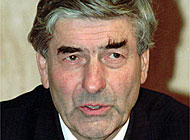Lubbers to be new champion of world’s refugees

The United Nations secretary general, Kofi Annan, has named Ruud Lubbers as the new UN High Commissioner for Refugees. The former Dutch prime minister will have the difficult task of persuading member states to increase support for the agency.
Lubbers is to take over in Geneva from the current High Commissioner, Sadako Ogata, when her second five-year term runs out at the end of this year.
Her tenure has witnessed an increasing number of refugee crises in the world, as a result of violent conflicts in Iraq, the Balkans, Africa’s Great Lakes region and East Timor.
The apparently last-minute decision to choose Lubbers, which was Annan’s alone, was controversial. He was not even considered to be a candidate for what is one of the UN’s most high-profile jobs.
Though the choice is likely to be approved, it raises questions about the transparency of the UN’s selection procedures. Even Lubbers himself appeared to have no warning that he would be picked.
“It’s a complete surprise,” he was quoted as telling a Dutch television channel. “I have no idea what made Kofi Annan think of me.”
Among the frontrunners for the post were the head of the UN mission in Kosovo, Bernard Kouchner, his counterpart in East Timor, Sergio de Vieira de Mello, the Norwegian foreign minister, Knut Vollebaek, and the Dutch environment minister, Jan Pronk.
A Dutch government source said The Hague was “flabbergasted” by the decision.
Nevertheless, the fact that the Netherlands is the seventh-largest contributor to UNHCR coffers is believed to have been a factor, as was the fact that Lubbers is seen as a safe pair of hands, and less outspoken than the likes of Kouchner and Pronk.
Lubbers’ background as an economist could also have been a decisive factor. Over the next five years, he will have to tackle a serious shortfall in funding by persuading member states to contribute more, or by radically reassessing the agency’s operations.
In her final speech to the UNHCR’s governing body, Ogata said the agency would be critically weakened unless it received urgently needed funding.
She said it was unable to meet the basic needs of millions of refugees from Afghanistan, and had had to scale back a number of important relief programmes.
Lubbers will also have to deal with the safety and morale of his personnel. Humanitarian workers are increasingly being targeted in conflicts and, since 1992, 19 UNHCR staff members have been killed in the line of duty.
Just a few weeks ago UNHCR staff staged a demonstration in Geneva to demand greater security.
The 61-year-old Lubbers was Dutch prime minister for 12 years, from 1982 to 1994, and was one of the architects of the Maastricht Treaty on European economic and political union, which was signed in 1991.
He has twice been passed over for a major international post: first in 1994, when German opposition prevented him from becoming president of the European Commission, and then a year later, when the United States objected to his candidature for the position of NATO secretary general.
by Roy Probert

In compliance with the JTI standards
More: SWI swissinfo.ch certified by the Journalism Trust Initiative
You can find an overview of ongoing debates with our journalists here . Please join us!
If you want to start a conversation about a topic raised in this article or want to report factual errors, email us at english@swissinfo.ch.